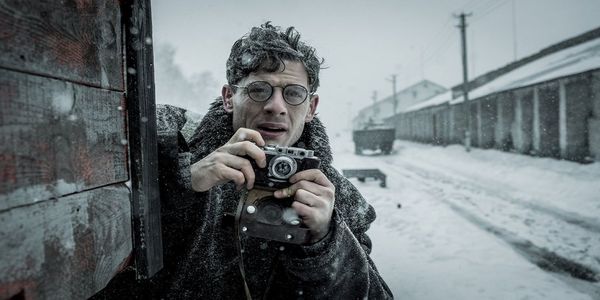Fake news is not a new thing. The extent to which it has been weaponised in recent years feels like something only the 21st century could create, but as Mr. Jones shows us, media and the truth have always had a very fraught relationship.
Set in the 1930s, Mr. Jones is the story of Gareth Jones, the foreign affairs advisor to former PM David Lloyd George who, after being let go from his position due to budget cuts, travels to Russia to visit a friend. When he arrives, he finds the friend has been murdered and it seems as though he was asking the wrong questions about Stalin and the success of the glorious five-year plan. Investigating how the supposedly broke country is funding huge technical and military achievements takes him to Ukraine where he finds out exactly what is being sacrificed for these successes.
Animal Farm
Acting as a framing device to the above, are scenes of George Orwell writing his seminal Animal Farm, an allegorical work which depicts the rise and cruelty of Stalin as a tale of animals taking control of their farm and gradually succumbing to greed and evil.

I’ll admit that, while I love Animal Farm, the scenes of Orwell writing and narrating his novel felt sometimes too much. There’s a line where subtext simply becomes text and the scenes crossed it very quickly. It’s not hard to understand, if you have read the book, how the Ukrainian famine influences the novel, so having scenes of the famine intercut with Orwell talking about the famine in his novel seem superfluous.
Orwell’s role in the story makes more sense when he actually meets Jones and can’t believe what Jones is telling him about the Communist country. Orwell, a Socialist, represents those people who believed in the Communist utopia before the extent of Stalin’s brutality emerged.
Fake News
Watching this in 2019, it is hard to imagine a time when people didn’t know that Stalin was a stone-cold baddie. Mr. Jones gives us that time. The movie opens with Jones giving an impassioned speech about the dangers of a certain Mr. Hitler in Germany, only to be laughed out of the room by a bunch of brandy swigging government fat cats.
Stalin is viewed with slight suspicion but also awe at his achievements, turning Russia into a superpower seemingly by sheer will alone, mostly based on the fact that the only news they know is coming from the party or from Western journalists enjoying a life of luxury while being confined to Moscow.
Jones’ experiences in Russia are akin to a man in a dream. Every question is answered with silence or another question. Nights out with other writers quickly turn in bacchanals of drugs, jazz, and nudity. And as he walks home, shadowy figures follow him, not trying to hide their presence, in fact hiding their presence would miss the point of their actions.
He is naive about the place and the situation, and it is Vanessa Kirby’s character, Ada, who clues him in to the fact that the walls have ears and asking the wrong questions could lead to you being on the bad end of a ‘robbery gone wrong’.
The fight between the truth and the Truth is the central conflict in this movie, and the cautionary nature of it is a theme that feels too real today where we have no idea if the headlines and news stories we read are from actual sources or created to push us in a certain direction, away from the real truth and into a murky miasma of lies and fabrications.
Mirrors
Technically, director Agnieszka Holland has created a movie that radiates cold. Once Jones arrives in Ukraine, the cinema dropped below freezing and the intensity of the suffering is not looked away from or shielded from us. The people suffering under the famine have become as hard and cold as the winter landscape, and Holland shows us scenes of violence, betrayal, and the depths that people will sink to in order to survive with very little romance.
She also has an eye for mirrors and reflections. Someone smarter than me or more well-versed in film theory could probably expound on their particular meaning but if you’ll indulge me, I took them to be a physical representation of the essential idea that there are two sides to every story.
We’re constantly seeing characters reflected in mirrors and mirrored surfaces, while we are watching the propaganda machine pump out lies and brave journalists trying to find a way to get at the truth, never mind reporting it.
Conclusion: Mr Jones
In the central role, James Norton, imbues Jones with a mixture of happy go lucky and world-weary, until his trip to the Soviet Union sucks the colour and verve from him. He is a captivating presence onscreen who manages to do the big emotional moments and the tiny charming bits with equal skill.
Mr. Jones is a harsh, masterful film about being wary of the lies being fed to you by your media and your government. The world is much stranger, crueler, and an unforgiving place than we sometimes imagine and horrors happen all the time that we have no idea about. So don’t believe everything you read, hear, and that your grandparents share on Facebook.
Does content like this matter to you?
Become a Member and support film journalism. Unlock access to all of Film Inquiry`s great articles. Join a community of like-minded readers who are passionate about cinema - get access to our private members Network, give back to independent filmmakers, and more.